Innovation is now in spotlight in China as the world’s second-largest economy strives to transform its economic structure and hone its innovation capabilities under the New Normal.
To increase innovation capacity and create favorable environment, the State Council has made a series of plans and policies this year.
Among the 25 State Council executive meetings presided over by Premier Li Keqiang this year, nine focused on issues related to innovation. The following are plans and policies on innovation made at the State Council executive meetings from January to July.
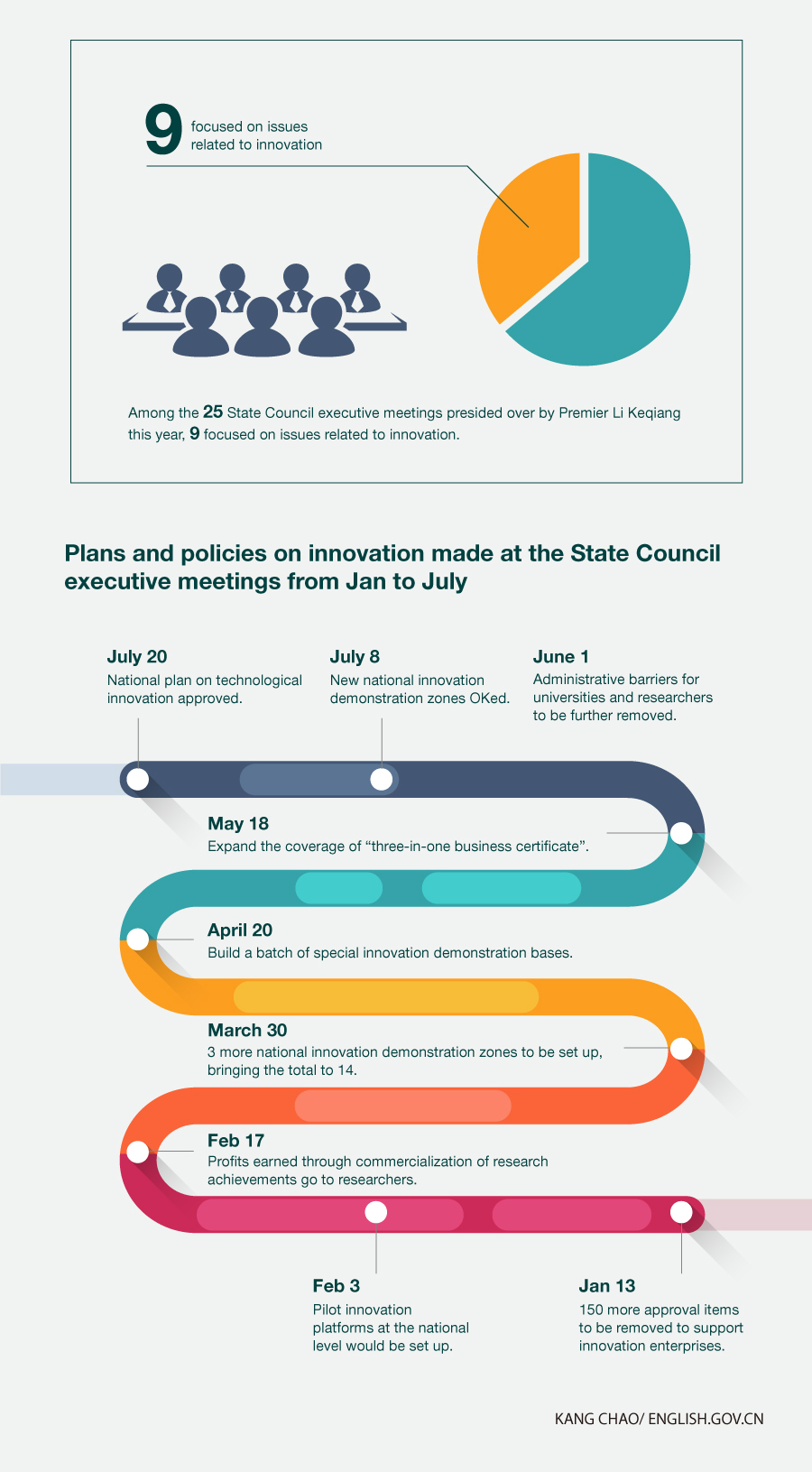
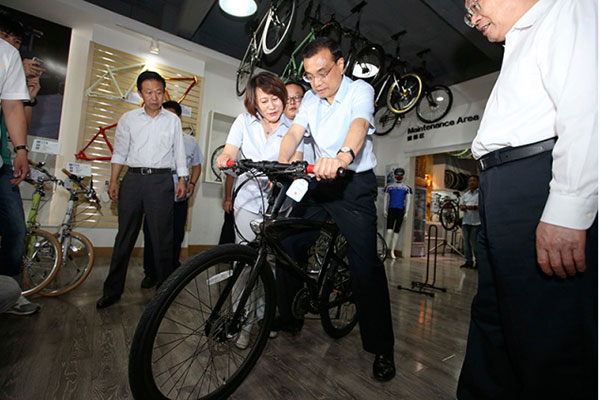
Premier Li gets on a super intelligent bicycle built from carbon fiber, for a test ride during a visit to a Flying Pigeon bicycle experience store in Tianjin on June 26. He said that he hopes the Flying Pigeon to carry forward the spirit of entrepreneurship and innovation.
July 20: National plan on scientific and technological innovation
The State Council executive meeting approved a national plan on scientific and technological innovation during the 13th Five-Year Plan (2016-2020).
The plan aims to make China an innovation powerhouse by 2020.
According to the plan, efforts will be made to:
-Strengthen innovative ability, improve research on technology, and build a batch of major sci-tech facilities and establish national science and technological research centers;
-Launch new major scientific projects in key areas such as quantum communication and medical treatment, and put more emphasis on developing major industrial technologies such as seed industry, clean coal utilization, fifth-generation mobile communication and intelligent robots;
-Highlight the importance of innovation, improve the business incubator system such as innovation services and maker spaces, and establish a standard and open technology traction market;
-Speed up sci-tech system reform, stoke people’s enthusiasm, implement measures to improve scientific research funds management and rights and interests distribution of sci-tech achievements, and strengthen innovation culture building.
June 8: New national innovation demonstration zones
The State Council executive meeting approved the establishment of the two “national innovation demonstration zones” in Fujian and Anhui provinces.
The new zones will create a platform for talent and business startups and efforts will be made to expand reform of streamlining administration, delegating power, strengthening supervision and improving services.
June 1: Fund reform to boost scientific innovation
To boost scientific innovation through institutional reform, the State Council decided to further improve regulation on the management of science and research funding and remove administrative barriers for universities and research institutions to better boost enthusiasm from teachers and researchers.
To improve fund management for scientific research projects, efforts will be made to:
-Delegate part of fund management rights to institutions that undertake scientific research projects so that they can keep any remaining funds after project completion;
-Raise merit pay for science research project personnel in direct expenses (excluding equipment expenses) from 5 percent to up to 20 percent;
-Enable scientific research institutions and universities directly under central ministries to make their own decisions on travel and meeting expenses;
-Streamline management of procurement for scientific research equipment so that scientific research institutions and universities directly under central ministries can made decisions on equipment purchases;
-Authorize more infrastructure project autonomy and streamline related administrative approval procedures.
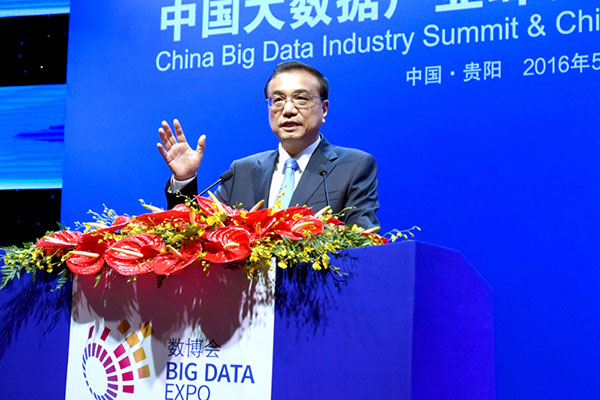
Premier Li delivers a speech at the opening ceremony of the China Big Data Industry Summit & China E-commerce Innovation and Development Summit held in Guiyang, Southwest China’s Guizhou province, May 25. [Photo/Xinhua]
May 18: Reform commercial system to create better environment
The State Council decided to continue reforms on the commercial system to create a better market environment for mass entrepreneurship and innovation.
According to the plan, efforts will be made to:
-Continue reducing preapproval items for business registration, exploring the management of negative lists for business licenses, and accelerating the development of pilot areas for separate business licenses;
-Create an equal opportunity business environment and improve market exit mechanism;
-Expand the coverage of “three-in-one business certificate”;
-Support those who become unemployed during the process of eliminating overcapacity.
April 20: Establish hubs to promote innovation
The State Council executive meeting decided to build a batch of special demonstration bases to promote mass entrepreneurship and innovation.
The first batch of demonstration bases will be chosen in some regions of cities and provinces, as well as universities, scientific research institutions, enterprises with good performance and internet enterprises.
The demonstration bases should focus on streamlining administration and delegating power to lower levels, creating a fair and competitive environment and developing the sharing economy.
In addition, the bases should give priority to business system reform and separating business licenses from administrative permits and introduce tough measures on intellectual property protection.
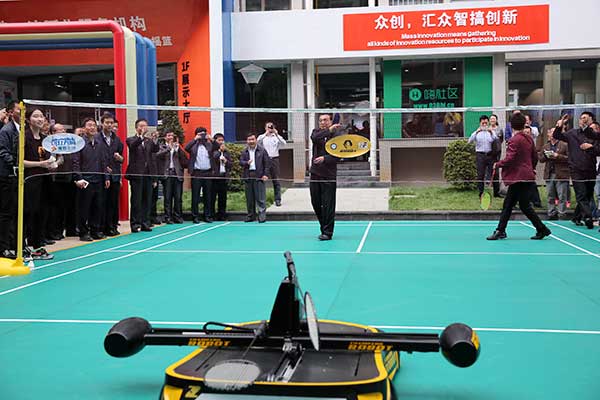
Premier Li plays badminton with robots in Jingrong makers town in Sichuan province on April 25.
March 30: New measures to boost innovation
The State Council executive meeting made new policies to boost innovation.
Three more national innovation demonstration zones will be set up in provinces of Henan, Shandong, and Liaoning, bringing the total to 14.
Comprehensive innovation reforms will be carried out in China’s financial hub of Shanghai within three years.
To reach the goals, four measures will be taken to:
-Improve policies concerning equity incentives and income distribution to motivate scientific and technical personnel;
-Better facilitate allocation of resources to encourage colleges and research institutes under ministries;
-Increase employment by encouraging mass entrepreneurship and innovation;
-Improve follow-up supervision and deepen commercial reform, with efforts to minimize governmental intervention and explore management systems that encourage innovation.
Feb 17: Commercialize research to drive innovation
The State Council executive meeting discussed policy measures for the commercialization of scientific and technological research.
As an important move to carry out the supply-side reform and transform China’s scientific research system, the measures will be implemented to encourage commercialization of scientific and technological research achievements, improving productivity and advancing the country’s innovation-driven strategy.
To implement commercialization of scientific and technological research:
-Research findings will be commercialized to enterprise without national level approval and more achievements will be encouraged to be sold to small and medium-sized enterprises;
-Profits earned through commercialization go to researchers;
-At least 50 percent of commercialization rewards go to major researchers;
-Researchers will be allowed to work with enterprises buying their research findings for a maximum three years while keeping their position at the research body;
-Commercialization of research discoveries will be included in the evaluation system of research institutions and universities.
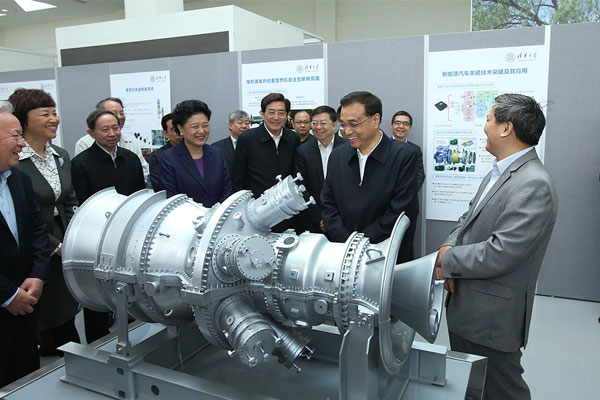
Premier Li stresses the importance of innovation in scientific research and technological development during his visit to Tsinghua University, a top university in China, on April 15.
Feb 3: Pilot platforms to promote innovation
The State Council executive meeting decided to develop makerspaces to accelerate the cultivation of the new driving forces.
Pilot innovation platforms at the national level should be set up to promote the development of mass entrepreneurship and innovation bases in various places.
Factories and warehouses that were left unused can be changed into innovation bases and makerspaces, and subsidies are granted for facilities such as offices, water, power and internet.
Angel investment and venture capital fund should be introduced, and special financing services can be tried at selected financial institutions.
In addition, preferential tax measures will be explored.
Jan 13: Simplification of rules to support innovation enterprises
The State Council executive meeting discussed efforts to simplify administration and delegate power to lower levels to support mass entrepreneurship and innovation enterprises.
According to the plan, efforts will be made to:
-Cancel 150 more approval items on taxation and departmental preapproval on local enterprises’ issuing bonds;
-Remove 10 more departmental administrative license constraining mass entrepreneurship and innovation;
-Abolish or standardize 192 more intermediary service items;
-Integrate hygiene license and food business operation licenses for restaurants, cafes, bars and tea houses;
-Abolish regulations for 61 more professional qualification certificates.
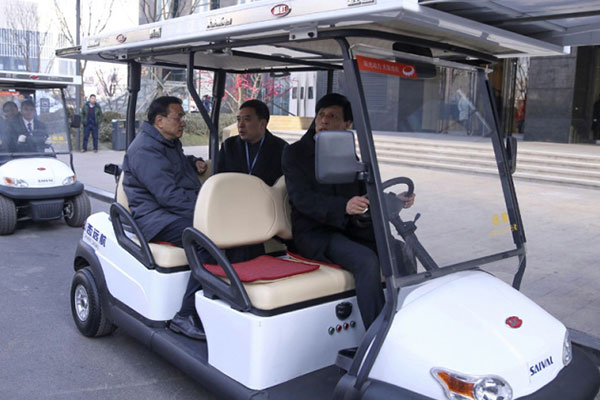
Premier Li takes a ride in a solar car during his inspection tour in the Qingkong innovation makerspace in Taiyuan, Shanxi province, on Jan 5.
